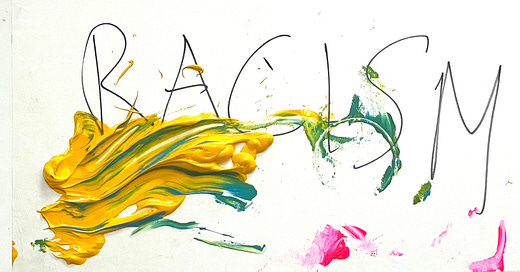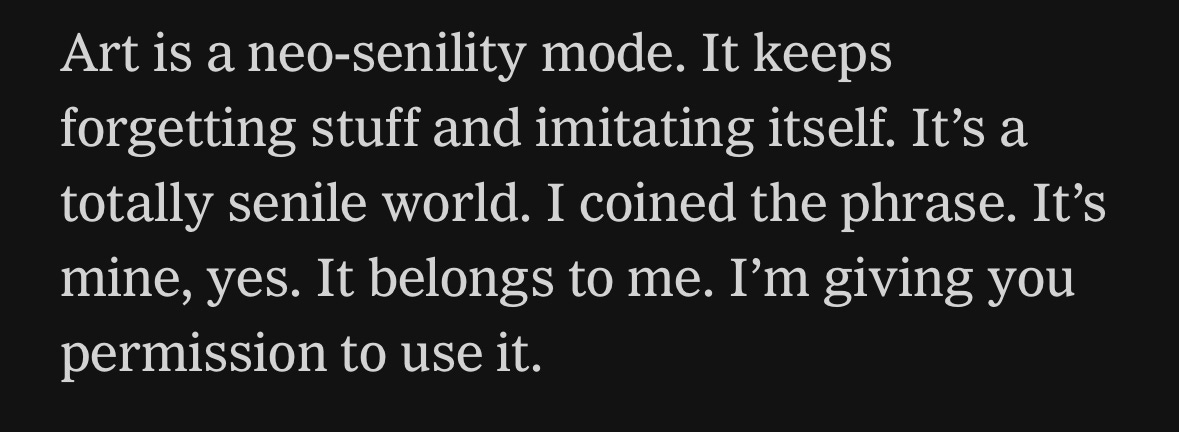Yasha and I recently talked to Alexander Melamid, one of the few high priests of the art world who talks shit openly about it and got disenchanted with the cult of art long ago.
I’ve been interested in Alexander ever since I found out about his humorous movement — neo-senilism — which he came up and promoted over a decade ago as the logical conclusion of modern art. It’s a broad term but it really encompasses pretty much all the conceptual and political art produced today — the facetious and pretentious mix of philosophy, moralism, activism.
Melamid’s point of view immediately connected with me because I have long thought that the senility he talks about transcends the art world and is present in culture in general. I guess I first started noticing it in film because it’s the medium closest to me.
As the great film directors of our time are aging and are solidly in their third act of life — their films have naturally gotten more senile.
This first became obvious to me when I watched Ridley Scott’s Prometheus in a movie theater in 2012. Scott was in his mid-70s then. There was something off about the film. It had a very specific kind of vibe — the barely cohesive plot, the aggressive confidence it was directed with, the constant references to the past, the cliche philosophizing about the meaning of life, the general confused energy, and the fact that the film was the 5th installment in a franchise launched in the late 70s… it all made me think of senility. Often when old people start to somewhat lose it mentally they get more assertive and aggressive —a known fact in the medical profession.
After Promethius I started noticing it more. In fact most Ridley Scott films in the last decade have that senile energy. Francis Ford Coppola latest film Megalopolis, that I did love — despite great lucid moments and encouraging optimism — is not very cohesive and sometimes flat out doesn’t make any sense. In short, it has “senility” written all over it.
But the senilism I’ve been seeing in the film industry isn’t just restricted to the age of certain directors. It is bigger than that — it’s become a mindset, a culture-wide phenomenon. You can see it in the constant remakes of old classics, the proliferation of franchises, and the fact that Marvel and Disney now dominate the cultural landscape — stories meant for children (and meant to evoke nostalgic cultural connections in adults) are now the biggest most expensive and most lucrative vehicles in the film industry, and some of the only ones that get big theatrical releases and long runs. What is it if not a collective fall into dotage? We live in the past rather than in the present, overcome with nostalgia for “better days,” not open to anything new and can’t envision a future different from the version of the past.
Even the actors themselves won’t let themselves change — most of the ones I grew up with are literally trying not to age…to act and be just as they were in their youth. Tom Cruz who is in his 60s still tries to look 30 and to run and jump as fast and high as he used to. He has no gray hairs and on the screen he does look sort of the same. It is comforting on some level, but it’s also freaky. I’m 35. I have changed — I have grown up, I have a family, a daughter…time has moved forward. And yet this passage of my time in the world is not reflected in any way in the Hollywood movies. Everything has been frozen since I was six years old. Nicole Kidman, who I remember with Tom Cruz in Far and Away, has also been trying to remain that same age. She has zero wrinkles, her lips are all modded up to look puffy and young, and she’s got reflective scary white skin. Kidman is in her late 50s but is still trying to be a sex kitten — like in her latest movie Babygirl.
This collective escapism we are engaging in can feel soothing but the thing is the world is burning and there is not much reflection on it in the films — besides the idea that some action hero can magically fix it all.
With age you lose mental flexibility — which is fine because then the younger people take over while you retire. But it’s not what’s happening in America. All the people in positions of power politically and culturally are quite old. They aren’t dying and they aren’t relinquishing their grasp on things.
Donald Trump’s MAGA movement is explicit on embracing senile nostalgia for a better past. Even Bernie Sanders, perhaps the best thing to happen in American politics in the last decade, built his whole campaign on cultural senility: appealing to 1960s civil rights movement and promising to reboot 1930s New Deal values into American society in 2020s. His focus was on the past — on how great things used to be when he was younger. In that sense Bernie is like Donald Trump but from a different political direction: both promised to Make American Great Again…like it was in their youth. They are just different in how they define “great.” And of course Bernie’s version is immensely better and humane and yet the senility is there…
And then there was Joe Biden, 82, who was deemed fit to run for presidency despite his clear signs of serious cognitive decline. He couldn’t say a sentence without slurring and yet the Democratic Party tried to convince everyone he was just fine!
So both Trump and Bernie are part and parcel of the culture of American senility. Bernie is 83. Trump is 78. Not only are they both in the age when senility hits. But their ideas and slogans are all about returning to “the great past” — to their golden age.
Of course you can’t say that the sheer fact of appealing to something in the past is the sign of senility. But the sure signs of active mind, intelligence is an ability to synthesize, an ability to come up with new solutions — not rehash old ones that might have no relevance to the world as it is today. As these senile leaders appeal to some great past — the times of their youth — they at the same time do nothing to stop the horrors of the present and seem to believe deep down in the old adage “après moi, le déluge.” Boomers like Bernie are more generous and want the kids to experience a better America — the America that they got to live in their youth more or less carefree. With the Trump world, they want to go back too but even father back…back before the New Deal and before the civil rights and women’s movement… Yet no one really looks forward, which is very much a sign of senility. In Russia we have a saying — “falling back into childhood” — which happens to elders and signifies the full circle their life is making.





